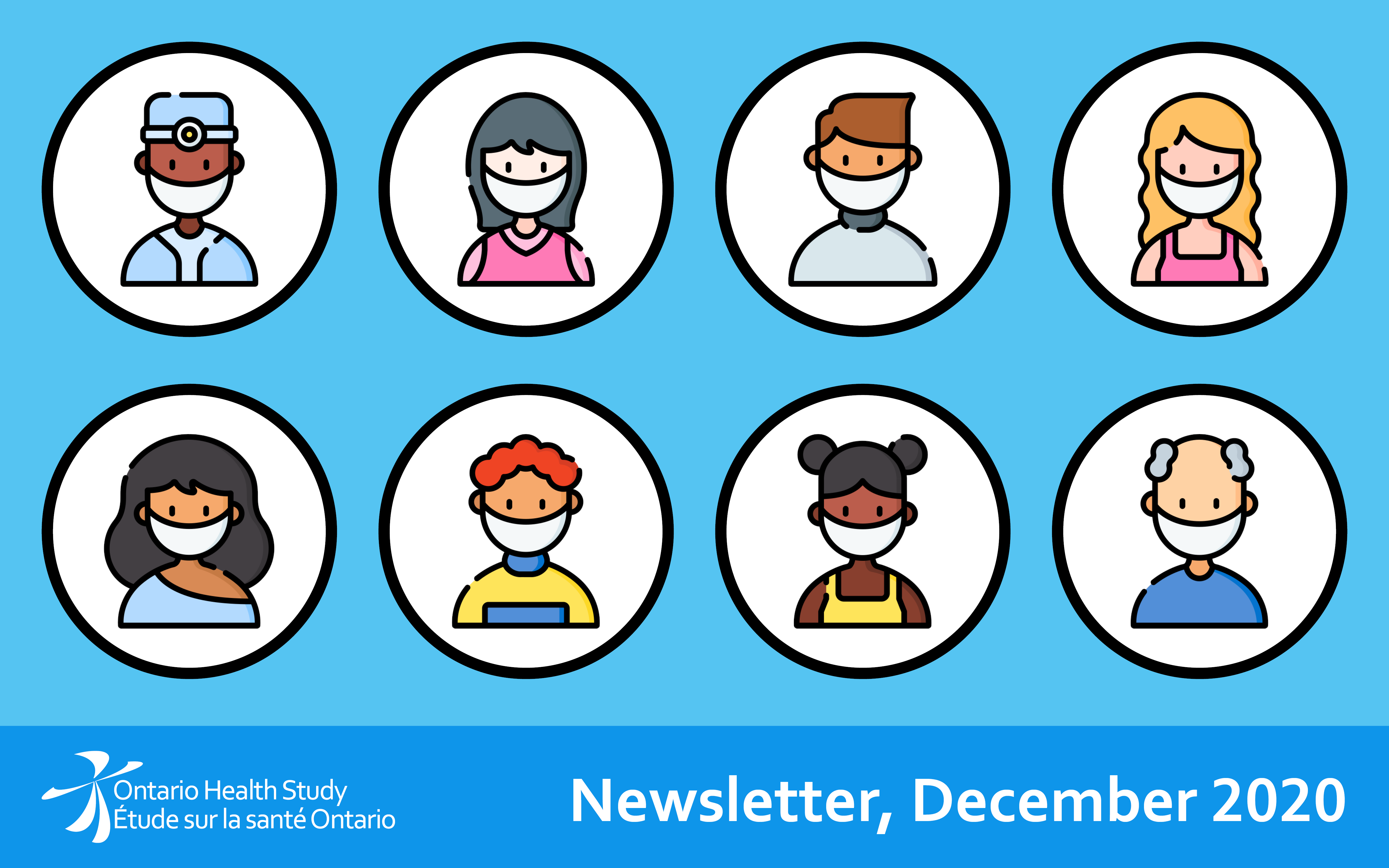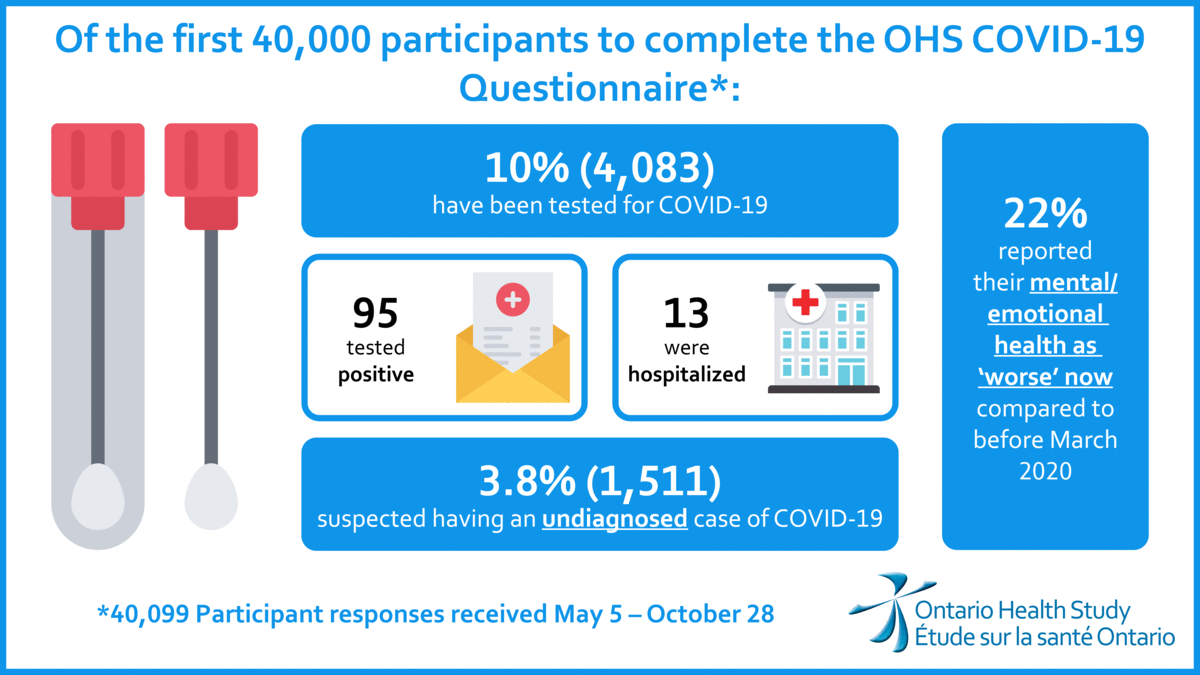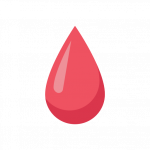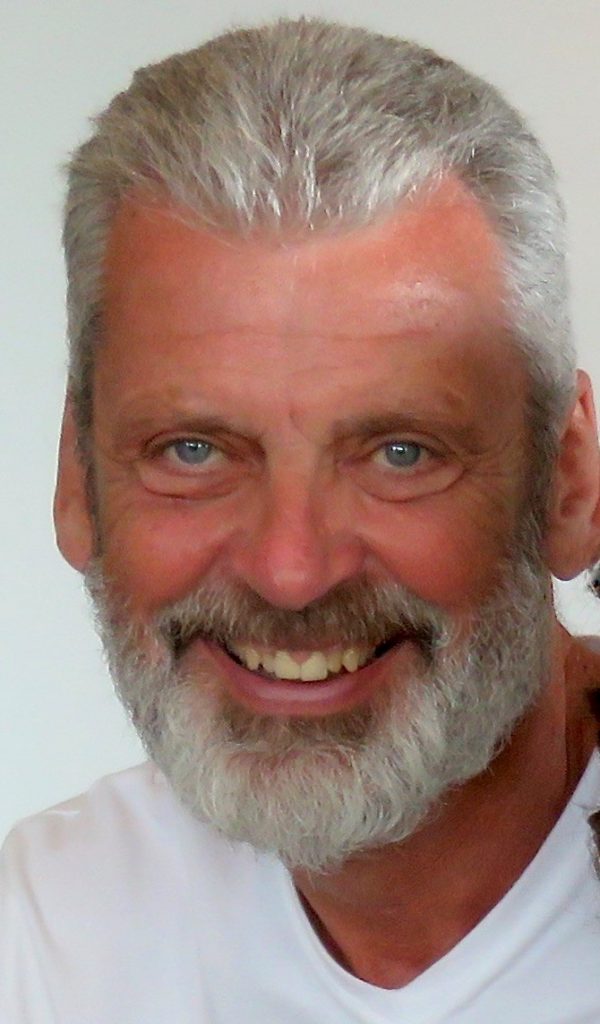The Ontario Health Study Newsletter, December 2020
Dec 7, 2020 // OHS Newsletter

In this issue:
-
Coming soon - We want a blood sample!
-
It's a lot bigger than just our COVID-19 Questionnaire
-
More than 40,000 contribute to ongoing COVID-19 research
-
Check out how your data will be used
-
Future blood tests could detect cancer years earlier
-
Staying in touch
-
Keeping an eye on your privacy
-
Why did you take the COVID-19 Questionnaire?
Coming soon - We want a blood sample!
Did you complete our recent COVID-19 questionnaire? We may be asking you for a small blood sample to test for antibodies to SARS-CoV-2.
This winter the OHS will reach out to 12,000 participants, asking them to use a home blood kit to provide a few tiny drops of blood onto a lab card, and mail it back.
Our lab will test the dried blood spots for COVID-19 antibodies, which indicate a past exposure to the virus. Participants will later be able to view their individual results online via their OHS account.
This exciting project is part of a larger research initiative that will test 20,000 Canadians for virus antibodies. The study will focus on adults ages 30 and older who may have been exposed to SARS-CoV-2 in populations that may have a higher risk of exposure to COVID-19. Learn more.
Stay tuned for more information, but here’s what you need to know now:
WHO: About 12,000 of the 42,000 OHS participants who completed the recent COVID-19 questionnaire
WHAT: Selected participants will get a ‘blood spot’ kit delivered to their home. They will prick their finger using the kit’s lancet, place five droplets of blood onto a special lab card, let the blood spots dry, and seal the lab card in a return envelope.
WHEN: March – June 2021
WHERE: Kits will be delivered to a participant’s home. Participants will use the kit to provide the blood sample, place the completed kit in the return envelope and mail it postage-paid via Canada Post. Prior to receiving the kits, participants will be asked to sign an online consent form that explains the research study.
WHY: Public health officials need to know the level of exposure to the COVID-19 virus in the Canadian population. The Government of Canada has invested $1.9 million through Canada’s COVID-19 Immunity Task Force (CITF) to fund this study of seroprevalence across Canada.
WHAT’S IN IT FOR PARTICIPANTS: The OHS will tell you whether your blood samples showed antibodies for SARS-CoV-2. Results will be made available via the participant’s OHS account.
It's a lot bigger than just our COVID-19 Questionnaire
The COVID-19 questionnaires – and soon, some new blood samples – provided by OHS participants are feeding into a broader initiative that will help researchers determine how many Canadians may have been infected with the virus.
The Ontario Health Study is part of CanPath, Canada’s largest population health research platform. CanPath has been awarded $2.6 million from the Canadian Institutes of Health Research (CIHR) and Canada’s COVID-19 Immunity Task Force for its SUPPORT-Canada Initiative.
The initiative, titled SUrveying Prospective Population cOhorts for COVID-19 pRevalence and ouTcomes in Canada (SUPPORT-Canada), will:
- Collect population and clinical-level COVID-19 data and outcomes from over 400,000 Canadians to support personalized risk profiling, and inform public health responses as the pandemic continues
- Create capacity for world-leading research in immunophenotyping (using antibodies to identify cells infected with markers of the virus), seroprevalence (determining how common these antibodies are in a population) and viral genetics (determining the genetic sequence of the virus to provide clues to how it may be spreading).
- Explore the role that genetics, underlying health conditions and the environment play in shaping how COVID-19 affects the body and how the body responds to it.
The results gleaned from SUPPORT-Canada will be used to inform public health responses, and boost capacity for testing research and development. This rapid-response SUPPORT-Canada initiative has also been designed to integrate with other national and global research efforts.
More than 40,000 contribute to ongoing COVID-19 research
Data analysis is now underway, following the closure of the OHS COVID-19 Questionnaire on November 13th 2020. Here are some early results gleaned from the first 40,000 participants to submit their questionnaires.
Interestingly, while most of the precautionary measures stayed about the same or dropped slightly, mask-wearing rates rose. Participants who completed their questionnaire after June 11th were roughly 20% more likely to report having worn a mask in public.

We would like to send our heartfelt thanks to all 42,145 OHS participants who shared their story with us by completing their questionnaire, including 1,135 who reached out to retake their questionnaires after experiencing new symptoms, or undergoing COVID-19 testing.
Our team has spoken to many participants these past months, some of whom were infected with COVID-19, hospitalized, or continue to experience prolonged symptoms as “long-haulers”. We wish you all a full and speedy recovery, and thank you for important contributions to the worldwide knowledge around COVID-19.
This year has turned many of our lives upside-down. The data you have provided is an invaluable resource for researchers in Canada and across the world who seek to understand the virus, and ultimately keep as many people safe and healthy as possible.
Check out how your data will be used
Now that the questionnaire has closed, the data is currently being analyzed, de-identified and made available to researchers as part of CanPath’s national COVID-19 Initiative. So what comes next? OHS Scientific Associate (and lead researcher on a number of approved data access requests) Dr. Victoria Kirsh explains just some of the many uses of COVID-19 Questionnaire data in this video:
Future blood tests could detect cancer years earlier
What if a simple blood test could spot a cancer in your body - years ahead of getting a biopsy to confirm a diagnosis? A small group of OHS participants is helping researchers explore ways to use blood samples to identify cancers much earlier than the current method: a tissue biopsy.
Blood samples provided by over 1,000 OHS participants are at the centre of two studies looking for early ‘signatures’ of common cancers.
Right now, most of our understanding of how cancer evolves in the body is done by examining small samples taken from tumours. But researchers are learning more and more about how components of blood, and DNA taken from those blood samples, can be used as ‘liquid biopsies’ to find markers of a cancer well ahead of a traditional diagnosis.
The beauty of a long-term study like the Ontario Health Study is that researchers can follow the evolution of a person’s health over time. Some people came into the study healthy, but developed cancers or other health conditions as time passed.
The OHS effectively offers researchers a chance to ‘walk back in time’, and study patterns in our DNA as our cells evolve from healthy to cancerous, explained Dr. Philip Awadalla, Executive Scientific Director of the OHS. This might help scientists unlock the secrets of preventing that cancer from developing in the first place, or at least treating it much earlier, and boosting survival rates.
One project using OHS blood samples looks at how our blood changes as we get older.
“As blood ages, there are often changes or genetic mutations in the blood stem cells and the bone marrow. We want to see - how early are we able to see these signature changes occur?” said Awadalla.
The second project looks for markers of early mutations in cell-free DNA that can be found in blood. Cell-free DNA are DNA fragments circulating in the blood, and can be shed from virtually all tissues, including cancers. Researchers are finding that the DNA shed from cancerous cells looks different to that which is shed by normal, healthy cells. By identifying cell-free DNA specific to cancer tissues, scientists can detect signs of solid cancer tumours months to years prior to when an individual might expect to receive a primary cancer diagnosis.
When a tumour is present, even while it is still clinically undetectable, some tumour cells die and leave behind a hallmark signature of cell-free DNA that can be captured in blood plasma samples, Awadalla explained.
For this project, Awadalla’s lab at the Ontario Institute for Cancer Research is looking at:
 |
139 blood samples from OHS participants who entered the study cancer-free, then subsequently received a breast cancer diagnosis |
 |
19 blood samples from OHS participants who had an incidence of pancreatic cancer |
 |
272 blood samples from participants who experienced prostate cancer since registering for the Study |
Researchers are comparing these samples against a control group of blood samples from 430 participants who did not develop a cancer during the course of the 10-year Study. Early work is showing that solid tumours can be detected with this approach up to five years prior to the point in time when a cancer diagnosis was made, said Awadalla.
Using a ‘liquid biopsy’ to look for cancer has key advantages:
- Less invasive for the patient
- Easy and inexpensive to obtain
- Can be used to study most cancers
- Could one day be used for early cancer screening
Staying in touch
This is our friendly bi-annual reminder to log into your account and make sure that we have your most up-to-date contact information, including your phone number, email, and mailing address. Given the long-term nature of studies like the OHS, it’s important to keep an open and reliable line of communication between participants and the Study team.
Can’t access your account? Give us a call or shoot us an email and we’ll be happy to help!
|
|
|
|
|
|
|
|
|
Keeping an eye on your privacy
We are always updating and reviewing our systems to keep your questionnaire data and biosamples secure. We’ve recently updated some of our website FAQs about what we do with the data you provide, including who has access to your information, how it is kept secure when linked with other databases, and what happens to your information after your death.
Please review these new and updated privacy FAQs on our website.
Why did you take the COVID-19 Questionnaire?
|
Here’s what Michael from Brockville had to say:
“I do not hope or wish to live forever... although: so far so good! But I do firmly believe in a better quality of life, especially in older age and for the underprivileged. And I also firmly believe that the only way we/they will get it is through scientific discovery and the dissemination of those discoveries, i.e. education. It only makes sense that I contribute a tiny bit towards those ends. Even if I do not necessarily benefit from my participation, I have no qualms about planting a tree under whose shade I will never sit.”
We love hearing from you. Why did you join the Ontario Health Study? Email us at info@ontariohealthstudy.ca |
 |



